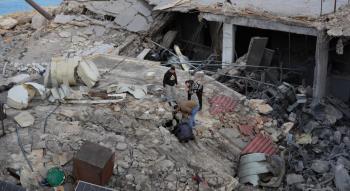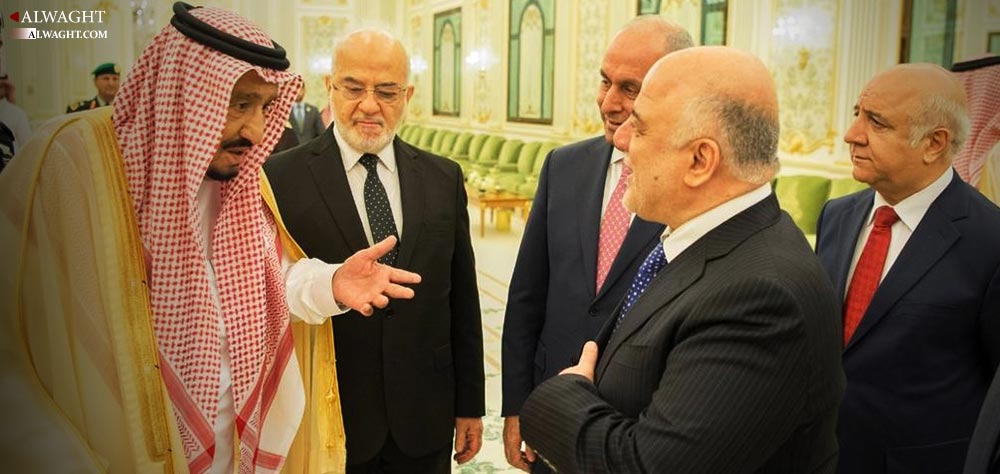Alwaght- Enduring several years aggression and occupation by terrorist groups and air campaign of the US-led international coalition that has inflected heavy blows to the country's infrastructure have wreaked havoc in the country’s war-affected regions. Now that ISIS has been obliterated in the county, the top obsession of the Iraqi officials is the reconstruction of the country, where the size of the destruction is substantially large. Baghdad leaders are now counting the costs of starting rebuilding period in a post-ISIS Iraq, with the funding issues taking the center stage, among other challenges.
Haitham al-Jubouri of the Iraqi parliament’s Financial Commission has recently told the press that an international conference on the reconstruction of Iraq will be hosted by neighboring Kuwait on 12-14 January. He hoped that his country could attract big sums from the funding sides to reconstruct the biggest ever demolition of the nation’s infrastructure. Al-Jubouri added that some 70 Arab and foreign countries will participate in the conference. This is beside participation of a set of Arab and international organizations, including the World Bank and the Kuwait Fund for Arab Economic Fund.
In the meantime, Saudi Arabia has been one of the countries that zealously announced its candidacy to be among other creditors contributing to fixing up Iraq's ruined cities. Over the course of past months, Riyadh stepped up a campaign of influence gain in Iraq. The kingdom, eyeing the upcoming parliamentary election as providing the best scope for getting a toehold in the country and cozying up to the groups splitting from the body of the government, now finds the government’s pro-rehabilitation efforts as the best movement to seize in a bid to realize its agenda.
On Sunday, Anwar Eshki, a member of the Saudi Council of Ministers’ advisory council, has told the Russian Sputnik news agency that the Kingdom expressed its readiness to take part in the international conference to be hosted by Kuwait. “But the kingdom has asked Iraq to fulfill some conditions first. He maintained that the government should offer guarantees on the fate of the aids given to Baghdad by Riyadh. Eshki said that Iraq is under the Iranian and other countries’ influence and that Riyadh wants to know how its aid cash is spent in Iraq. The Saudi official pointed out that his country is already providing aid supplies to several countries, which are guaranteed by the World Bank and other international bodies.
Who is Anwar Eshki?
Anwar Eshki is a retired Saudi military intelligence chief and the architect of the Saudi Arabian diplomatic normalization with the Israeli regime. His comments have always drawn waves of reactions on the media. Eshki who is close to Saudi decision-making circles and the senior Saudi officials has so far visited Tel Aviv at least twice and held talks with the regime's authorities. Last summer, he told the media that the Arab nations still refuse cooperation and coexistence with Tel Aviv because they are not rational. He is also a proponent of Iraq partition. In early June 2015, Eshki attended a conference hosted by New York-based Council on Foreign Relations titled “Regional Challenges and Opportunities: The Views from Saudi Arabia and Israel.” He told the Council for Foreign Relation that working for the creation of a Greater Kurdistan through peaceful means would "reduce Iranian, Turkish and Iraqi ambitions. This will carve away one-third of the territory of each country in favor of Kurdistan."
Saudi Arabia and Influence in Iraq
Saudi Arabia under King Salman bin Abdulaziz is very different from the state under the previous rulers. The highly noticeable feature of the kingdom’s foreign policy under Salman is its belligerence. However, three years of aggressive policy and the resultant defeats in dealing with the regional cases, beside a zealous support for terrorism and inflammation of ethno-sectarian conflicts, have pushed the Saudis to the conclusion that in some fields they need to resort to the soft power. Iraq is in desperate need for financial support to reconstruct the former strongholds of ISIS. This is one of the fields where Riyadh could test how good it is at getting a foothold in Iraq.
The important point about the help is that the aid should come without preconditions neither by the receivers nor by the providers. But Saudi Arabia stipulated that it needs to know how and where Baghdad spends the allocated cash. This is apparently a violation of the sovereignty and independence of Iraq. In the first place, this condition might not appear to be troublesome to Iraq, but if the Baghdad leaders bow, they will give with their own hand to Saudi Arabia loopholes for later Saudi interferences in their internal affairs. It seems that Saudi Arabia has set such a precondition to become aware of Iraqis plan for reconstruction of their country and subsequently interfere in applying those projects. In next steps, if Baghdad yields to the conditions, the kingdom will highly likely set new conditions for future deals.
But, at the time being, Saudi Arabia is itself financially suffering. Its budget is bearing the brunt of low oil prices and the heavy price paid for the war in Yemen, not to mention the costly backing of a series of terrorist groups fighting the national governments in the region. Amid this real financial predicament, the Crown Prince bin Salman in early November last year has detained many wealthy royals and businessmen, including the billionaire Prince Al-Waleed bin Talal, under the excuse of anti-corruption campaign. But experts believe that the purge targeted potential challengers of bin Salman in his course to ascend the kingdom's throne, while huge ransom was also demanded for billionaire princes' freedom. Bin Talal has been released this week and sources familiar with the case have maintained that he reached a settlement with bin Salman after paying $6 billion. In such a hard economic time, the announcement of readiness to help Iraq reconstruct raises some questions, with many analysts believing that Riyadh eyes great goals behind its aid offer.
This by itself urges the Iraqi leaders to be wary of the Saudi conditions, especially that the country urgently needs financial resources to bring back to life the war-ravaged regions. Iraqis know it well that the post-Saddam Iraq suffered huge pains many coming from the Saudi-encouraged internal political disputes and the non-stop patronage of the terrorists. The Saudi Arabian actions inflicted heavy damages on Iraq and took lives of thousands of Iraqis. Riyadh’s ambassador to Baghdad Thamer al-Sabhan’s extent of meddling in Iraq’s domestic affairs was so high and contemptuous that left the Iraqi authorities with no choice but expelling him. With its record of violations and hostility, it is not hard to figure out that the Saudi help offer is not intended to serve the Iraqi people or government’s interests.



























